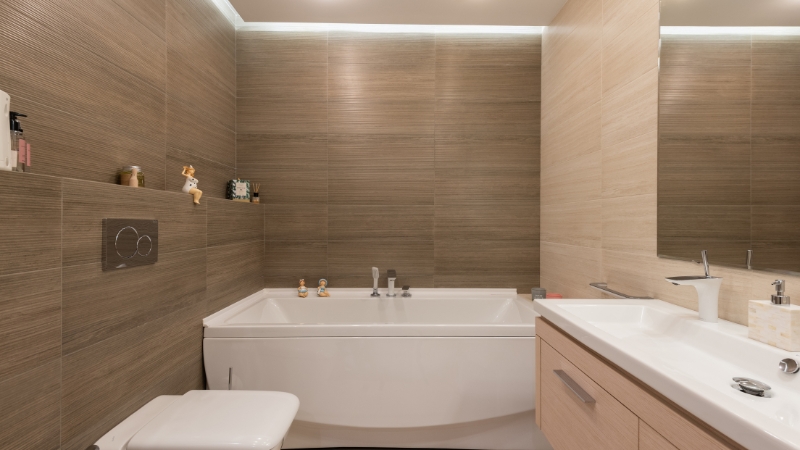When faced with a malfunctioning toilet, the decision between repair and replacement can be daunting. Understanding the factors at play is crucial to making an informed choice that aligns with your needs and budget. Repairing a toilet may seem like a quick fix, but repeated issues could indicate a deeper problem necessitating replacement. Consider the age of your toilet, the extent of damage, and long-term cost implications before deciding. By weighing the benefits of repair versus replacement, you can ensure optimal functionality and efficiency in your bathroom space.
Table of Contents
ToggleUnderstanding Toilet Issues
Common Issues
Toilets often encounter common issues like clogging, running continuously, or leaking water onto the floor. These problems can disrupt daily routines.
Toilets may also face a mold issue, which is not only unsightly but also poses health risks. Mold thrives in damp environments, making bathrooms a prime location for its growth.
Causes of Problems
The mold problem in toilets usually arises from moisture accumulation and poor ventilation. When left unaddressed, mold can spread rapidly and become challenging to remove completely.
Issues like clogging can be caused by flushing items that shouldn’t be disposed of in the toilet, such as wipes or sanitary products. It’s essential to educate household members on proper toilet use to prevent such problems.
Troubleshooting Tips
When dealing with a running toilet, check the flapper valve first as it is a common culprit. Adjusting or replacing the flapper can often resolve this issue quickly and inexpensively.
For leaking toilets, inspect the tank and bowl connections for any visible leaks. Tightening connections or replacing worn-out parts like seals can usually fix the problem.
- Inspect regularly: Regularly checking your toilet for signs of issues can help you catch and address problems early.
- Seek professional help: If troubleshooting doesn’t solve the problem, don’t hesitate to contact a plumber for expert assistance.
Signs Your Toilet Needs Replacement
Rusted Parts
Rusted parts in your toilet are a clear indication that it may need replacement. Rust can weaken the structure, leading to potential leaks and other issues.
Leaks
Leaking toilets are a common problem that often signals the need for a new one. Persistent leaks can cause water damage and mold growth, impacting your home’s safety.
Cracks
Cracks in the porcelain of your toilet can be a serious issue. Even hairline cracks can worsen over time, leading to leaks and other problems.
When you notice these signs, it’s essential to consider replacing your toilet rather than opting for repairs. While minor issues can be fixed, significant problems like consistent clogging or structural damage may warrant a full replacement.
Bullet list:
- Rusted parts weaken the toilet.
- Leaks can lead to water damage.
- Cracks in porcelain worsen over time.
Replacing an old toilet in an old house is often more cost-effective than constant repairs. The age of your toilet is crucial; if it’s been in use for over a decade, replacement might be the best solution.
Considering the frequency of clogs is also vital. If you find yourself dealing with frequent blockages despite attempts to fix them, it might be time to invest in a new toilet that functions efficiently.
Numbered list:
- Age of the toilet matters.
- Evaluate the frequency of clogs for decision-making.
Indicators for Toilet Repair
Faulty Flushing
If your toilet is flushing poorly, it might be a sign that the fill valve or flapper needs repair. This issue can lead to incomplete flushes and water wastage.
Continuous Running
A toilet that runs continuously can indicate a problem with the fill valve. This can result in higher water bills and potential damage if not addressed promptly.
Water Leaks
Detecting water around the base of the toilet or on the floor could be due to a leaking wax ring. Addressing this promptly is crucial to prevent further damage.
Slow Filling Tank
If your toilet tank takes longer than usual to fill up after flushing, it could signal an issue with the fill valve. This can impact the efficiency of your toilet.
Unusual Noises
Strange noises like gurgling or whistling during flushing may indicate problems with the flush valve or water supply line. These issues should be fixed promptly to avoid further damage.
Wobbling Toilet
A wobbling toilet can be a result of loose bolts securing it to the floor. Ignoring this issue can lead to leaks and structural damage over time.
Repairing these indicators promptly can prevent more significant problems down the line, saving you money and hassle in the long run.
Repair vs Replacement Cost Analysis
Repair Option Efficiency
Repairing a toilet can be a cost-effective solution for minor issues such as leaks or running water. It is generally cheaper than replacing the entire unit.
Long-Term Financial Implications
Opting for repairs may seem budget-friendly initially, but consider the frequency of repairs. If your toilet requires frequent fixes, the costs can add up over time.
Water Bills Impact
A leaking toilet can significantly impact your water bills. Even a small leak can waste hundreds of gallons of water per day, leading to increased expenses.
Factors Influencing Cost Assessments
When deciding between repair and replacement, take into account factors like the age of the toilet, extent of damage, and efficiency concerns.
Pros and Cons
Pros of Repair:
- Cost-effective for minor issues
- Immediate solution for common problems
Cons of Repair:
- Cumulative costs over time
- May not address underlying issues effectively
Consideration Checklist
- Evaluate the severity of the issue.
- Compare repair costs with replacement costs.
- Factor in long-term maintenance expenses.
Assessing Toilet Stability
Movement Check
To assess your toilet’s stability, start by checking for any movement or wobbling when in use. A stable toilet is crucial for safety.
Inspect the base of the toilet and ensure it is securely anchored to the floor. Any movement can indicate loose bolts or a damaged wax ring, requiring immediate attention.
Sealing and Installation Importance
Proper sealing and installation are essential for maintaining a stable toilet. A well-sealed toilet prevents leaks that can lead to water damage over time.
Ensure that the wax ring between the base of the toilet and the flange is intact and properly sealed. This helps in preventing water seepage, ensuring the longevity of your toilet.
Regular Maintenance
Regular maintenance plays a vital role in assessing and maintaining your toilet’s stability. Over time, wear and tear can affect the stability of your toilet.
Check for any signs of water leakage around the base or on the floor near the toilet. Addressing these issues promptly can prevent further damage and ensure the longevity of your toilet.
Professional Inspection
If you notice persistent movement or instability despite checking for loose bolts or damaged seals, consider seeking professional help. A plumber can assess the underlying issues accurately.
A professional inspection can identify hidden problems such as deteriorated subflooring or improper installation, ensuring a long-term solution to maintain your toilet’s stability.
Water Usage and Bill Impact
Toilet Efficiency
Upgrading to a water–efficient toilet can significantly reduce your water usage. These modern toilets use less water per flush, helping you save on water bills.
Cost Analysis
An average person uses the toilet about 5 times a day. With an old, inefficient toilet, each flush can waste gallons of water, leading to higher bills.
Environmental Impact
Old toilets contribute to unnecessary water wastage, impacting the environment. By switching to a more efficient model, you can reduce your carbon footprint.
Long-Term Savings
Investing in a new toilet may seem costly upfront, but the long–term savings on your water bill make it a financially wise decision.
Caring for Your Toilet
Regular Cleaning
To keep your toilet in top condition, regular cleaning is essential. Use a mild cleaner and a toilet brush to scrub the bowl and under the rim. Ensure you clean both the inside and outside surfaces to prevent stains.
Proper Maintenance
Maintain your toilet’s functionality by following proper practices. Check for any leaks or drips, which can indicate a problem. Tighten loose bolts or connections to prevent water wastage.
Avoid Flushing Harmful Items
Be mindful of what you flush down your toilet. Avoid flushing items like wet wipes, cotton balls, or paper towels as they can clog the drain. Stick to using only toilet paper to prevent unnecessary blockages.
Plumbers for Repairs
When facing issues beyond basic maintenance, consider calling professional plumbers. They have the expertise to handle more complex problems like persistent leaks or clogs that affect the whole house’s plumbing system.
Handling Clogs
If you encounter a clog, try using a plunger first before resorting to harsh chemicals. Plunging can often dislodge minor clogs without causing damage to your toilet’s internal components.
Preventative Measures
To avoid frequent repairs or replacements, implement preventative measures. Install a drain strainer in your shower and sink to catch hair and debris that could lead to future clogs in your toilet’s drainage system.
Making the Decision
Repair or Replace
When faced with a similar decision between toilet repair and replacement, weigh your options carefully. Consider the reasons behind the repair work and evaluate if it’s a temporary fix or a long-term solution.
Cost Analysis
Analyzing the work involved in repair versus replacement is crucial. Calculate the job expenses for each option, including materials and labor costs. Compare these figures to make an informed decision.
Repair Pros:
- Cost-effective in the short term
- DIY-friendly for minor issues
Replacement Pros:
- Long-term stability and reliability
- Modern features for improved efficiency
Efficiency and Water Usage
Assess the effective solutions offered by both repair and replacement. Evaluate if repairing your toilet will resolve persistent problems or if a new unit will provide a lasting fix.
Repair Cons:
- Temporary fixes may lead to recurring troubles
- Older toilets may consume more water, increasing bills
Replacement Cons:
- Initial investment can be higher than repairs
- Requires professional installation for optimal performance
Personal Circumstances
Consider your specific situation when choosing between repair or replacement. If you’re facing a big problem that requires immediate attention, opting for a quick repair may be necessary to stop further damage. However, if you’ve been dealing with multiple issues over time, investing in a new toilet could be more cost-effective in the long run.
Final Remarks
In the end, your toilet’s condition is crucial for your daily comfort and convenience. Understanding the signs that indicate repair or replacement needs can save you time, money, and future headaches. By carefully weighing the costs, stability, water usage, and maintenance requirements of your toilet, you can make an informed decision that suits your needs and budget.
Now that you have a clear understanding of the factors to consider when deciding between repairing or replacing your toilet, take action promptly to address any issues. Your well-maintained toilet not only ensures functionality but also contributes to water conservation efforts and reduces utility bills. Remember, a small decision today can lead to significant benefits in the long run.
Experience Excellence in Toilet Repair with Garcia Home Restoration!
We understand the frustrations homeowners face when dealing with toilet issues. Our dedicated team of licensed experts leads the way in providing exceptional toilet repair solutions that ensure reliability and efficiency.
Beyond just toilet repairs, Garcia Home Restoration offers comprehensive home maintenance solutions. Our reputation in Contra Costa County is built on unwavering quality, unmatched expertise, and the trust of numerous satisfied clients. Don’t compromise when it comes to your home’s functionality and cleanliness. Contact us today for outstanding toilet repair service and embrace a worry-free plumbing future!




